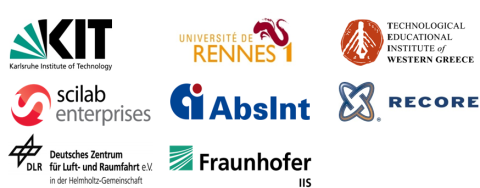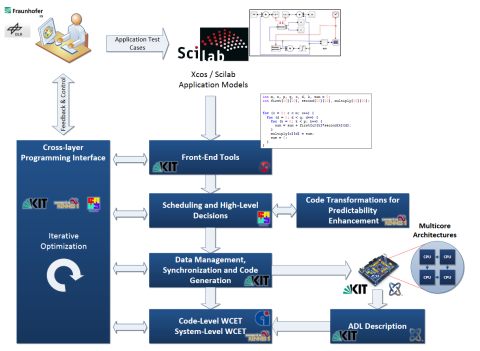Real time embedded systems require higher performance
The research project ALMA was a first step forward in the necessary introduction of novel computing paradigms and methodologies in the multicore architecture programming simplification.
The european research project ARGO goes further by aiming safety critical system introducing a hardware in the loop approach. These are the partners of the project:
Challenge
Increasing performance and reducing cost, especially time cost evaluated through Worst Case Execution Time (WCET), while maintaining safety levels and programmability are the key demands for embedded and cyber-physical systems in European domains, e.g. aerospace, automation, and automotive. For many applications, the necessary performance with low energy consumption can only be provided by customized computing platforms based on heterogeneous many-core architectures. However, their parallel programming with time-critical embedded applications suffers from a complex toolchain and programming process.
Solution
The ARGO (WCET-Aware Parallelization of Model-Based Applications for Heterogeneous Parallel Systems) research project will address this challenge with a holistic approach for programming heterogeneous multi- and many-core architectures using automatic parallelization of model-based real-time applications. ARGO will enhance WCET-aware automatic parallelization by a cross-layer programming approach combining automatic tool-based and user-guided parallelization to reduce the need for expertise in programming parallel heterogeneous architectures. The ARGO approach will be assessed and demonstrated by prototyping comprehensive time-critical applications from both aerospace and industrial automation domains on customized heterogeneous many-core platforms.
The ARGO tool-chain will translate model-based Scilab/Xcos applications into multi-core optimized C code with guaranteed real-time constraints. This shall be achieved by developing WCET aware automatic parallelization algorithms and a WCET analysis tool for heterogeneous multi-core architectures and parallel programs. Furthermore ARGO aims to provide a cross-layer programming interface, which allows end users to interactively control the automated parallelization process as detailed as needed.
Results
As a result to the ALMA project, the german company Emmtrix Technologies has been created to promote the use of the paralellization toolchain developed by the european consortium.
At CeBIT 2016, Emmtrix Technologies presented in cooperation with the Karlsruhe Institute of Technology (KIT) the emmtrix Multicore Coaster to showcase the capabilities of its solution. It is a ball run that consists of four parallel rails which stand for the four cores of a quad-core processor. The difficulty you have following the individual balls through the structure represents the complexity that software developers face when programming multicore processors.
This model will be used to validate the tool chain.

